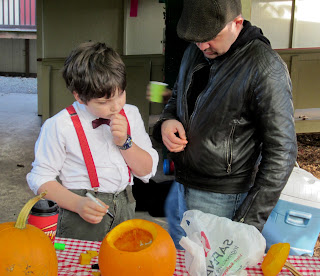by Karen Hyams, Clearwater
parent
[photos taken at The Clearwater School]
I’m the mom of a 17-year-old who has only taken two tests since
first grade. When, at 15, he took a test to see if he could take freshman
English at Cascadia
College, I was as curious
to see the results as he was; we had no past test-taking experience to compare.
He might have done well, he might have done poorly--nothing would have
surprised me. When he did well, it further bolstered my belief that you don’t
need to spend years “practicing” test-taking.
From the Apgar score on, kids in our society are measured,
compared, percentiled, assessed, and sorted so much that we parents seem to
have become addicted to a constant stream of data. When my family decided to
stop getting that information, to change to a school that didn’t test, the
decision was easy, but living with it later wasn’t so simple.
Leaving testing and homework behind had an immediate impact on
everyone in our family. Free from constant comparisons to friends in class, my
child was able to be himself and not contend with any hierarchy in the
classroom. He got goofier and much, much happier. A “no testing” culture meant
no running through tedious exercises designed for the test, no sorting by
ability to read, no fights about homework.
All of that was good for us, and there are too many other good
things to list. What I didn’t expect was to panic a little without that steady
stream of mostly meaningless information. I wondered, is he learning to read?
How is he doing socially? His days were unreported, his highs and lows private.
The only way I was going to find out how things were going was to talk to him.
I wish I could tell you that talking to him made me feel better,
but it did not. He didn’t tell me any of the things I was hoping to hear, and I
didn’t hear the meaning of all of the wonderful things he did tell me. It took
a lot of practice for me to stop looking for those things we’ve decided kids
need to know, and to see the things that had room to grow once they had the
space. Once I really learned to see my child outside the context of measured
education, I was able to hear his stories and see the growth they represented.
Ten years later I still
talk to my son to see how things are going, but I don’t do it out of worry
anymore. Even though he is of the age to start seriously thinking about
college, I’m not concerned with his lack of a transcript—I’ve seen plenty of
kids like him get into school and thrive, and then thrive after school as well.
And if he decides not to go to college when he graduates, we’ll all be OK. I’ve
learned to trust his instincts; I learned that by listening. A report card
wouldn’t tell me half as much as he does. And I’m talking about a 17-year-old
boy, one who isn’t very forthcoming. He’s the expert on himself; he’s the one
who knows how he’s doing. Why would I trust a standard list of grades more than
I trust him?





















